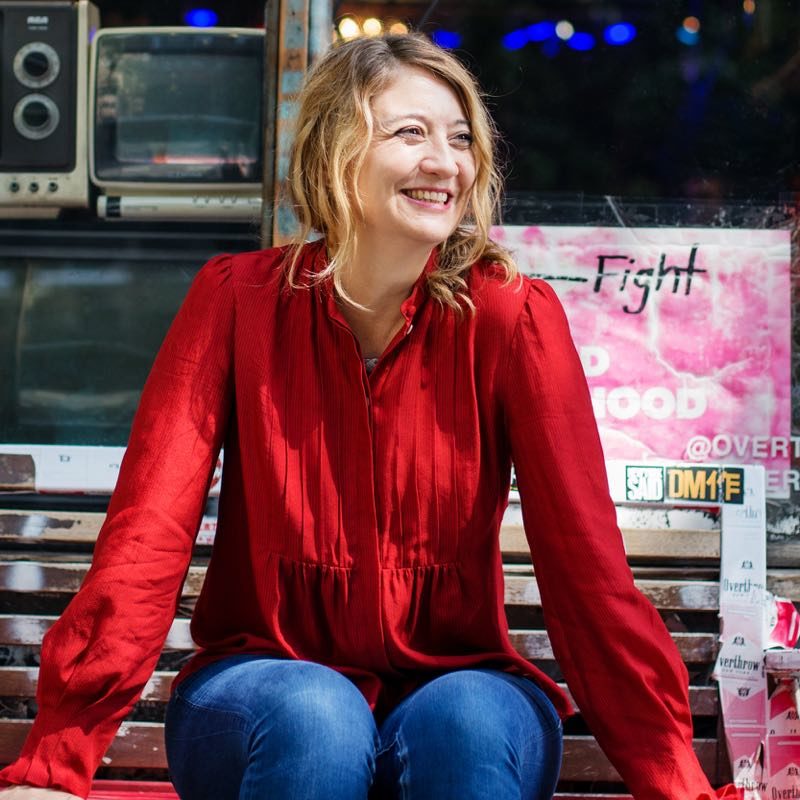Heidi Schreck on What the Constitution Means to Me (meaning her, and maybe you too)
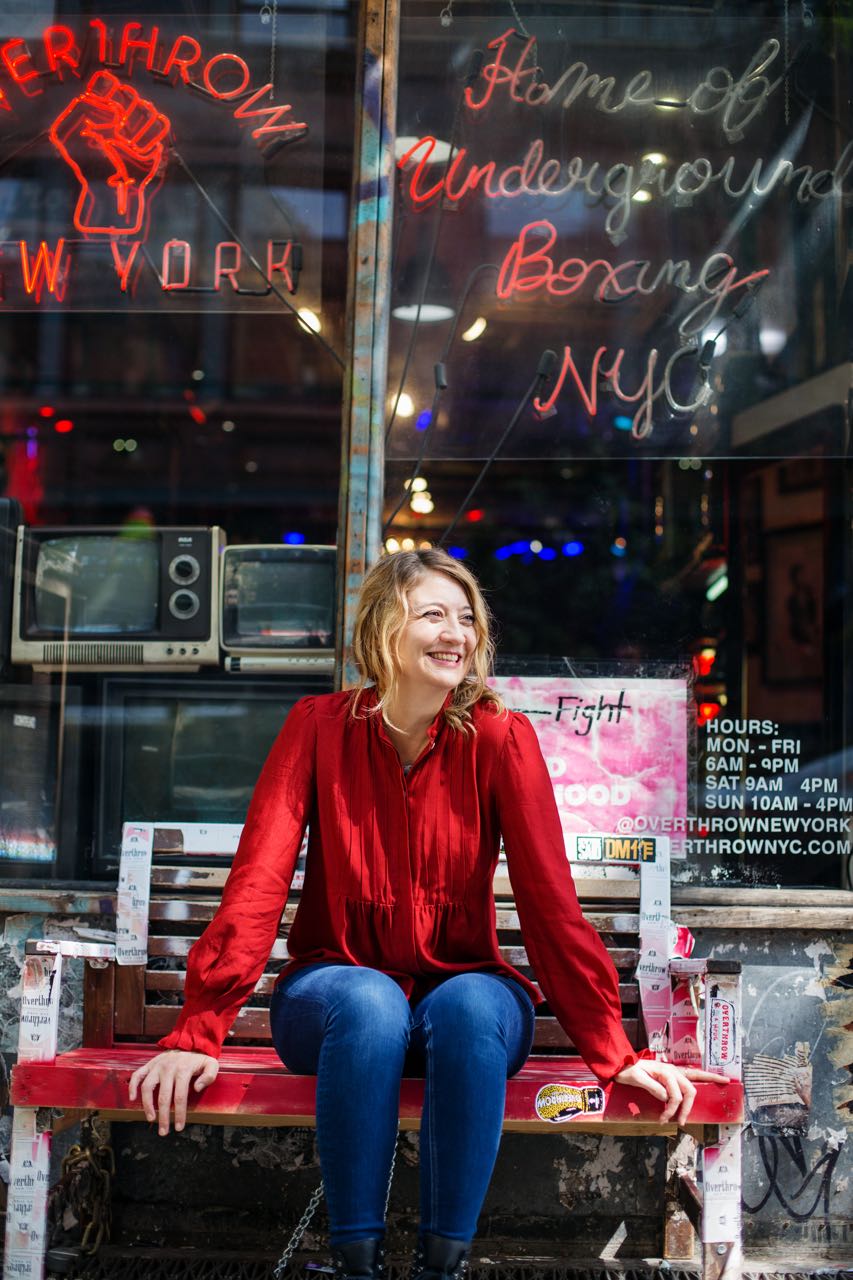
September 11th, 2018
The Constitution—which is very in or very out right now depending on how you look at it—is the subject of What the Constitution Means to Me a new play written and starring Heidi Schreck. More specifically, the show examines the Fourteenth Amendment (arguably the most important amendment) and its effect on generations of women in Heidi’s family—and on herself. Thematically, the show radiates out demonstrating her individual take on how being a citizen of a country can shape not only one’s opportunity and choices, but also a person’s existential beliefs. Heidi’s show goes on a journey through conflicting views of Constitutional interpretation and “the debate about whether this Constitution, given that it was born in corruption, is still capable of protecting us or ever was capable of protecting us;” a high school oratory contest; violence against women; and abortion—but funny!
Heidi, a writer and actress, has spent the last decade working on and off on What the Constitution Means to Me. In the interim, in addition to writing and appearing in other plays, she worked in television as a writer on Nurse Jackie, Billions, and I Love Dick; she was a writer on its most famous episode “A Short History of Weird Girls.” What the Constitution Means to Me had a short workshop run last summer as part of Clubbed Thumb’s SummerWorks, and is now at New York Theatre Workshop.
I recently spoke with Heidi about developing the piece, her thoughts on theatrical autofiction, the challenges of writing about violence against women and abortion, and more.
I know you’ve been working on the show for a long time. How did you decide on the form of the piece?
I first decided on its form when I did a workshop at Dixon Place in 2016. I’d been doing all this research into the Ninth Amendment and then into this one clause of the Fourteenth Amendment. I realized that in the Fourteenth Amendment, section one, there is this long sentence with four semicolons that has profoundly affected generations of women in my family. At that point I thought, “Okay, I’m going to structure it around this section of this amendment. And I’m going to use these four parts to structure the play.” Ten years ago, I knew that I wanted it to be a reinvention of the contest. That was my very first idea. Then in 2016 I realized I was going to structure it all around this one sentence and try to explore how deeply one sentence could affect a person’s life.
The piece is sort of a one-person show with other people. It’s also autobiographical. Do you view it as a one-person show or do you view it as something else?
I view it as something else.
To me, it seemed like the show was related to the idea of autofiction, which there’s no real theatrical equivalent to in terms of genre—or at least not in a codified way. Was autofiction an influence? Especially since you were a writer for the Amazon adaptation of I Love Dick (I Love Dick by Chris Kraus is often cited as an example of autoficition, although Kraus does not consider it to be such).
I had the idea for the play 20 years ago. I saw this play called The Race of the Ark Tattoo. Matt Maher starred in it in New York in the ’90s, and it was basically a rummage sale in which he would pick up an object and then tell a story about that object, but the objects were picked up in a random order depending on how the audience interacted with him. But the whole thing made this story together, this ostensibly autobiographical story about this character. It was by one of my favorite playwrights, W. David Hancock. Around the same time I saw Lisa Kron’s work. I was living in Seattle and she came there to perform 2.5 Minute Ride, which is a stunning autobiographical piece.
I remember at the time thinking how much I wanted to write about this Constitution contest I did as a kid. My first idea was to attach stories to different amendments or different clauses of the Constitution, because one of the goals of the contest was that you trace your personal connection to any given amendment. I was looking at the structure of how they were both writing. At that point I was mostly inspired by Lisa, and then by the structure of this other play and wanting to somehow connect the personal with the political and to use a kind of extemporaneous structure to make a story.
In the 20 years since then I got really into women’s autofiction, and I’m a huge Maggie Nelson fan, and obviously Chris Kraus came onto my radar. So, I think as I was developing the play, this fractured nature of personal storytelling combined with political analysis became really attractive to me, and also seems very much suited to writing about the Constitution and this contest I did as a young woman.
I have so much to say about this question that I get overwhelmed. But, yes, the piece is inspired in some ways by autofiction—by my love of Chris Kraus and Tao Lin and also Maggie Nelson, who writes what some have described as “autotheory.” I am positioning myself against larger systems and I am also playing a version of myself onstage. I use artifice to create the feeling that there is no artifice. Since I’m onstage, I also get to pull the rug out from under my feet by improvising parts of the performance, something you can only do in theater. This helps me get around all the ways I try to guard my ego.
It seems like in the last decade or so, autofiction has become associated with female writers. Do you think there’s anything to that?
Chris Kraus called the term autofiction “weird”—“Jack Kerouac, do we call that Autofiction?”—and noted that its current popularity was presaged by queer and women writers in the ‘90s. However, there is also obviously a rich tradition of putting the fictionalized self onstage in theatre, and I think this piece is predominantly inspired by the performers I idolized when I first started writing: Lisa Kron, Marga Gomez, Holly Huges, and later writers like Young Jean Lee and Jackie Sibbles Drury. Those specific women are a huge influence on me. Their work calls to me on a deeper level than plays by all the cis white men I have studied and performed. I feel liberated by these women’s example of putting themselves at the center of a narrative in a vulnerable position.
I love Hannah Gadsby. I was blown away by Nanette, but I also think it’s curious that her brilliant piece is not being contextualized in terms of this deep history. It feels like culture quickly forgets about groundbreaking work by women and queer folx and people of color, in a way we never will forget about say Tony Kushner—a writer I also idolize. Last week, I performed in the Maria Irene Fornes Marathon and I was shocked at how many people I respect were unfamiliar with her work. She is incomparable, how could any theatre person not know her? See, I’m spiraling, but I guess what I’m trying to say is that I don’t have an answer to your question. Is autofiction a form that particularly speaks to women’s experience? I don’t know. I hate to be a essentialist and I’m also hesitant to use the word “women” because who are we talking about exactly, and also because I am a very heterosexual cis-white woman, and I know I have so many blind spots.
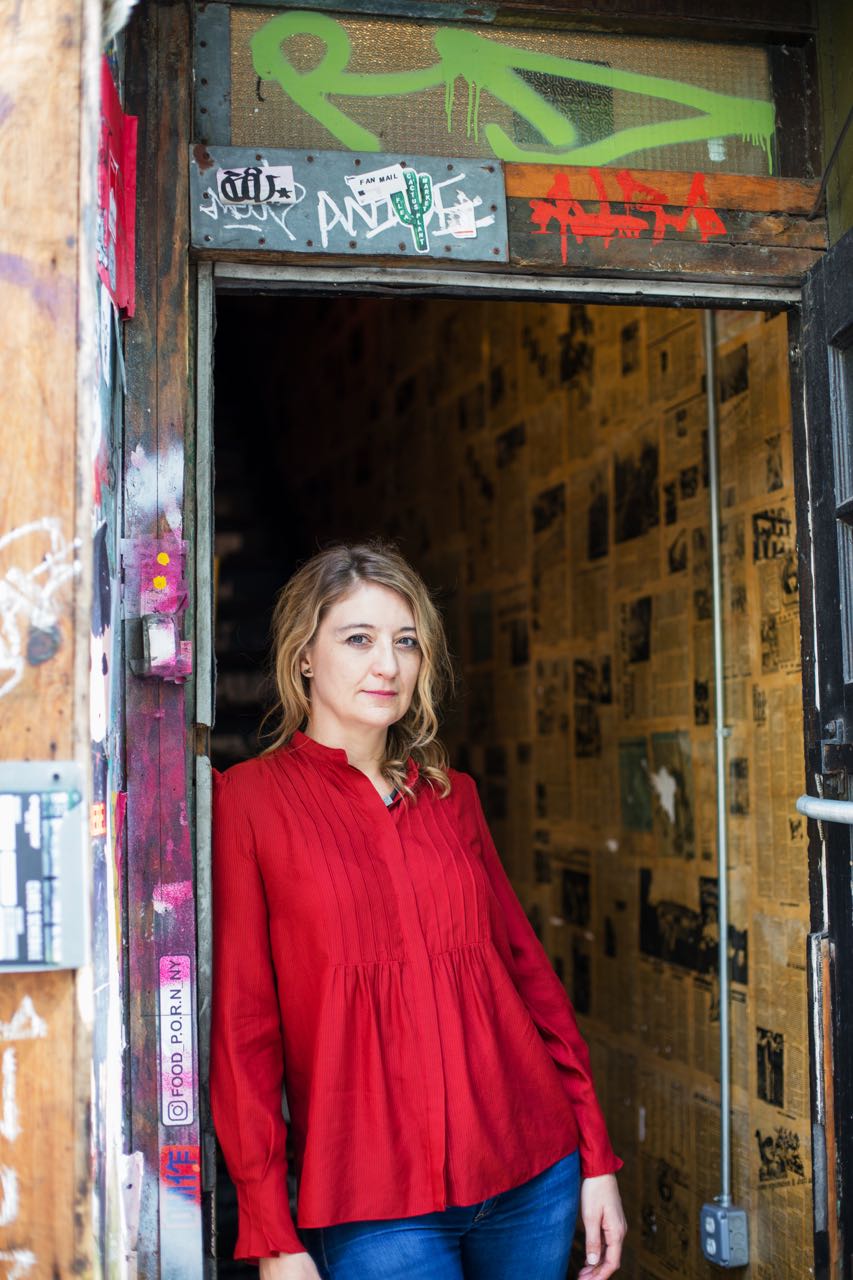
In terms of writing, when you’re writing a character that is you, and you know that you’ll be the one performing too, did you find that you had to work extra hard to not self-censor?
100%. Yes. I took Lisa Kron out for lunch and said, “How do I do this? I’m so terrified. How do I write about my own life without offending or upsetting the other people who are part of my life?” And she said to me, “Well, you will upset them, but it’s worth going forward.” I found that a great relief, just understanding that it was going to be difficult, but that it was still worth doing. I found in writing that it really made me have to face my own little tricks for getting around upsetting stories from my own life. It was like I had to confront the ways I censored myself both on the page, but also in my own life—the way I silence myself. So, it was a little bit of a battle between me and me.
Did you find that a lot of the fear came from what people in your life would think?
One thing I discovered is I view myself as a pretty open person, a candid person, and what I realized writing this play is that I actually have a lot of fear around subjects like trauma, and my family history around sexual violence and physical violence. I grew up speaking pretty openly about those things because my mom talks openly about them. Long before this moment she was pretty vocal about supporting other survivors of abuse and talking about her own history. But I realized when I started to include some of these stories in the play that I had a lot more fear than I had acknowledged.
In the first few incarnations of the play, I learned that I was more scared than I thought I was. Honestly, I don’t even know what I thought—I don’t think my brain could go that far. I would stand up and begin to tell a story and this kind of fog of terror and fear would come into me. I think it was at that moment that I realized how huge the taboo is in terms of talking about these kinds of things and how much of that taboo I had internalized without even realizing it.
Was there a moment or something that was helpful in terms of getting around that?
Talking to other performers who share stories like this, like Lisa. But really, no. In the beginning, I would feel like I was going to throw up every time before I went on stage. That was one of the reasons I closed the first Clubbed Thumb production to reviews, because I was like, “I don’t think I can physically do this if I think it’s going to be open to critical scrutiny.” I actually walked offstage the first night because I was so scared. When I got to the more difficult material I was like, “I don’t think I can keep going,” and walked offstage and came back on. Now, just talking about it more and more its become much easier. I think the most powerful thing for me was actually people in the audience responding to it. People waiting for me after [the show] and saying, “I had a similar experience,” or, “Thank you for sharing that story. This is my story.” That started to make me feel like it was bigger than me and I didn’t have to hold it all inside of me.
With subjects like abortion in the media, there’s been a fairly narrow way it’s been portrayed, with certain ideas about how people are supposed to react—like that it’s supposed to be traumatic—and that’s not necessarily accurate. When you’re dealing with a subject matter that people don’t always talk about publicly, did you feel like you also had to contend with the ideas the media has presented of how a person is supposed to react?
[In the US] One in four women have had an abortion. And yet, not only do we often not share it publicly, I think women often don’t even share it with one another or with their families, which is a big problem in terms of moving the needle politically because if you’re a conservative dad who doesn’t realize your own daughter had an abortion, your mind is not likely to be changed about whether you think safe and legal abortion is important for women. And one of the things I discovered doing the show was that lots of women who are my friends and women I know have had abortions, and we’ve never even talked about it with each other. I live in New York City, I’m in the theatre, I live among people who you would think would be pretty open about sharing these stories, and I don’t think we are, which to me suggests that the taboo is much deeper than we’re willing to acknowledge. I think it wasn’t just a matter of, “Will I tell the right kind of abortion narrative? Am I telling it the way you’re supposed to?” I think it’s hard to tell an abortion story where you say, “I don’t regret it and I’m so thankful that I was able to make that choice,” which is how I feel, and how a lot of women feel. More and more now there are lots of platforms where people are talking about this. I know I certainly was influenced as a young woman by the Ms. Magazine article that came out where women talked about having abortions. That was very huge for me, as was Dirty Dancing. They included an abortion in the plot that was non-judgmental, that was just part of the story. Given how common it is and given how many people believe in it as a right that women should have, I just think there aren’t enough stories about it.
In Roe v. Wade, the court ruled that women’s right to choose an abortion was located in the “right to privacy” — a right that was cobbled together using a bunch of different amendments. And related to this, the courts have also largely upheld that you have a legal right to keep your abortion private, but this has not stopped people from using abortion, say in a custody hearing to prove someone is an unfit parent. It has not stopped abortion protestors from harassing patients by publicizing their names. This has created a kind of “enforced secrecy” in relation to abortion, where you don’t want to tell anybody in case it comes back to hurt you. It’s not really an exercise of your “right to privacy” if you’re keeping it private because you’re justifiably worried about violence or stigmatization. This is what has been so helpful about the “1 in 3” Website and the “Shout your Abortion” movement because unless women and non-binary and trans folx can talk about their abortions, a huge swathe of the population will believe they’ve never met a single person who had one. And that therefore it’s not an important right to protect.
One of the other theatre pieces that tackles abortion—and there are only a few that do—is Everyday Rapture, which was written by Sherie Rene Scott, where she played Sherie Rene Scott. In that piece, like yours, abortion was portrayed in a non-traumatic way. It’s interesting that both of you used a sort of autofiction form. Do you think part of that form is that it’s also a way of showing that chances are you wouldn’t be there performing the piece and the audience wouldn’t be there watching it if you had not had an abortion?
That’s certainly part of the implicit narrative. I would say very frankly as a person who struggled with infertility when I was older, that I had a moment where I realized that, in spite of the fact that I struggled with infertility and had grief around the fact that I won’t have a biological child, I still was grateful for my abortion. That was a big moment of discovery for me.
But, yes, I think there’s a sense that being on stage and getting to do this—what is for me just a fascinating exploration of the Constitution and women’s bodies—and getting to write this thing, and do it at one of my favorite theatres in New York, and have this whole team of people supporting me in this investigation, is not something I would be able to do if I had had to have a baby as a teenager.
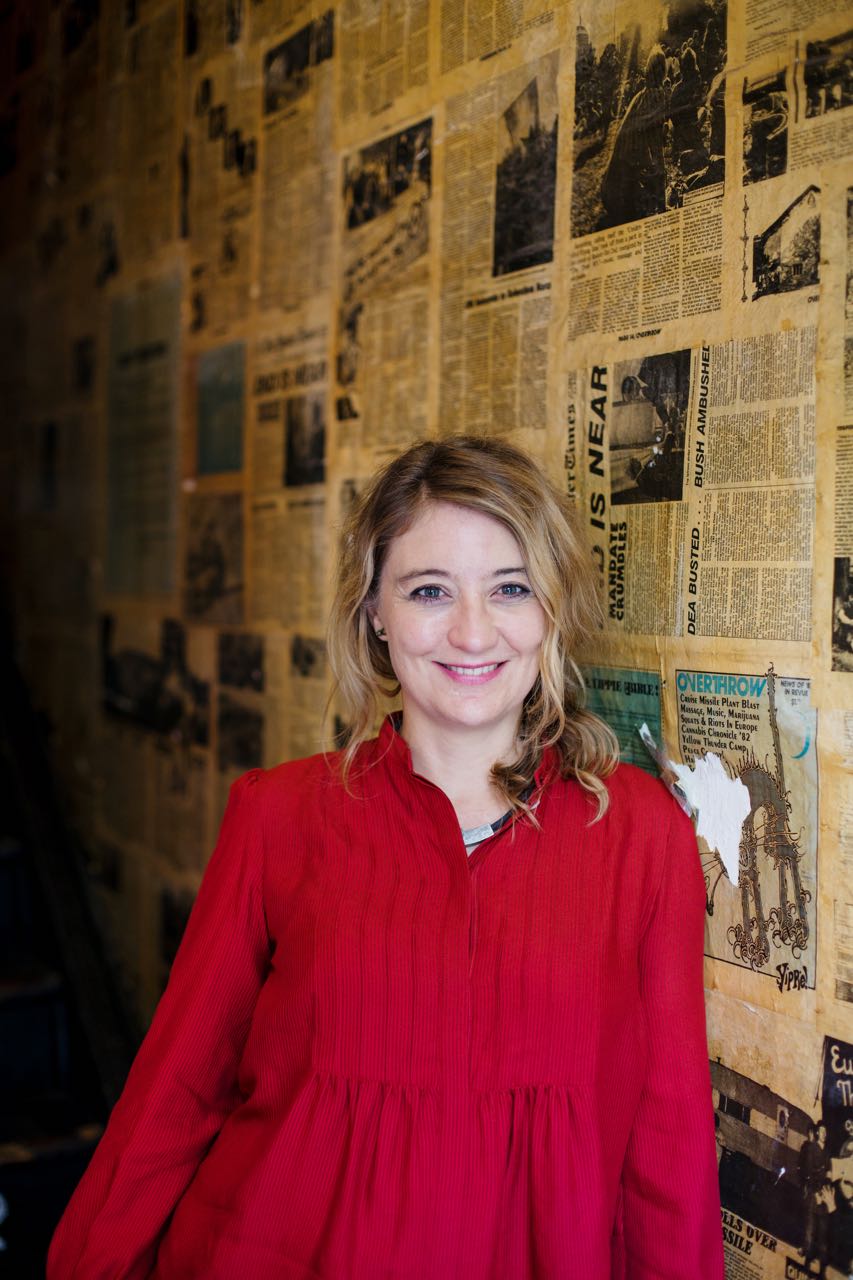
Going back to writing from biography and the people in your life, I would think that a lot of times when anyone is writing anything it’s autobiographical in some ways, even if you’re hiding behind other stuff or characters who are on the surface not you. The people in your life still might know.
Right. They know. They always know.
I think that’s such an interesting aspect of writing that I feel people don’t talk about that much: how it affects the people in your life, how you navigate that with any sort of writing because there is always some cost to the people around you.
Yes. There is always some cost to the people around you. I do think in my previous plays I’ve hidden the people I love very carefully because I don’t want to hurt anyone. Sometimes I’ve felt like I’m actually not ruthless enough to be a writer because I’m very concerned all the time about not hurting the people that I love. I’m really lucky to be married to a man who’s a director and in theatre and he gets it. And whenever he’s in the play he’s like, “That’s fine.” Even if he’s not happy about it, he understands. I think I changed the form for this play, in part, because I was tired of all the work of hiding things in my plays. It was actually a little exhausting to hide my true concerns inside my plays, inside of this fiction, inside of other characters. And maybe it’s both the age I’m at, being in my 40s now, and the moment we’re in as a country, but I’ve just felt like I just want to talk more honestly about what’s really going on. And, for me, because this involves generations of women in my family, I knew that at least the ones who are alive supported this project and I hoped that the women who are dead would understand why I was bringing all this to light. I hoped that were they ever to be reincarnated that they would be grateful that their story was getting told even if it’s upsetting.
Do you feel like the work you’ve been doing in TV influenced this piece or influenced your writing or your process or perforce style?
It’s hard to tell. I had been working on this piece so many years before I began my career as a television writer, that I think the seeds of it were not influenced by television. But I do know that working on I Love Dick while I was creating it influenced it. I do believe that the sort of brilliant intersection of the political and the personal that Chris Kraus finds in that book were an inspiration to me. But other than that, I don’t think so. Only maybe in that it’s so different than television. Maybe this was part of it. I had been working in television for almost five years and had not been on the stage since 2013 when I was in Shakespeare in the Park. I knew I was going to come back to the stage with this show, and I did think the show should only contain things that you could never do on TV. I do think working this long in TV made me want to embrace the things that only theatre can do.
In terms of new work development, is there anything you found that was helpful for developing something where you’re writing it, you’re in it, and it’s autobiographical. Or, did you find that the constraints of new play development were actually not helpful?
Luckily I was not very constrained with this piece. In the beginning it was just me and so I could work on it on my own and perform bits of it when I felt like. So I did it at PS 122 and JACK, and if someone was having a performance night they would ask me to do a little bit of it. So, I was able to basically develop it on my own for a long time. Then, I had this wonderful relationship with True Love Productions. They gave me money, and time, and space to develop it, and Tom Cole there was very supportive. He didn’t give me a deadline. He would always say, “What do you want to do now?” And I’d say, “I just want two weeks with [actor] Danny Wolohan.” So, Danny and I sat around telling stories to one another. And Danny was a champion about the whole situation. Danny’s a feminist and he’s somebody that’s done a lot of self-exploration about his own relationship to masculinity, in particular to toxic masculinity, and so he ended up having so much to bring to the process. Danny Wolohan made a huge and beautiful contribution to this show. He has been in nearly every incarnation. Sadly for me, he got a job on Broadway playing Boo Radley [in To Kill a Mockingbird]. I mean I’m happy for him, but… [For the NYTW production] I was looking for someone who is both a brilliant performer and someone I trust to be supportive of such sensitive material. Also, they had to be willing to share their own story, which is, of course, scary. I cast Mike Iveson because he’s one of my favorite artists in the city and also I have known him for years and love him.
To go back to the development process, sometimes I would lay out my little index cards with all the different stories and all the different constitutional cases, and when I started working with [director] Oliver Butler we would try to find the common threads. I wanted to work with Oliver because I’m a crazed fan of The Debate Society and I knew he had a lot of practice making plays in non-traditional ways. He’s a fantastic collaborator and he really helped me build this thing from the ground up. We spent hours and hours listening to Oyez.org, which has recordings of all the Supreme Court Cases. I was very lucky with this process and that I’ve just basically had a decade of getting to wander around and follow my mind wherever I wanted to go.
I know you haven’t started performing for this run yet, but I would guess you would have to approach the performance of this piece differently than if you’re acting in a play you did not write. Do you just have to think of it completely differently?
I have to think of it differently. The first problem Oliver and I encountered when we were working on the Clubbed Thumb production is that I would start to edit on my feet. I would say a sentence and then stop, and say, “That’s horrible. I need to rewrite it.” And I would go grab my script and rewrite it. We determined very quickly that that was not going to be an efficient way to work on the show. And that’s where the extemporaneous sections came from. Oliver at one point said, “Why don’t you develop this on your feet? You know the story. Don’t worry about the script. Why don’t you tell the story and think of this as, like, a living thing and when you’re up there you can’t stop. Just tell the story.” As soon as I started doing that it became really fun. I realized I loved extemporaneous storytelling. Also, it allowed me to be just the performer instead of the writer. So, for the Clubbed Thumb production, I really leaned on that sense of I’m telling the story for the first time. Now that I’ve done the show many times, I’m finally able to pretend like I’m a real actor, and I actually look at my script and say, “Oh, what was the playwright thinking here?” So, I’m finally able to approach it that way.
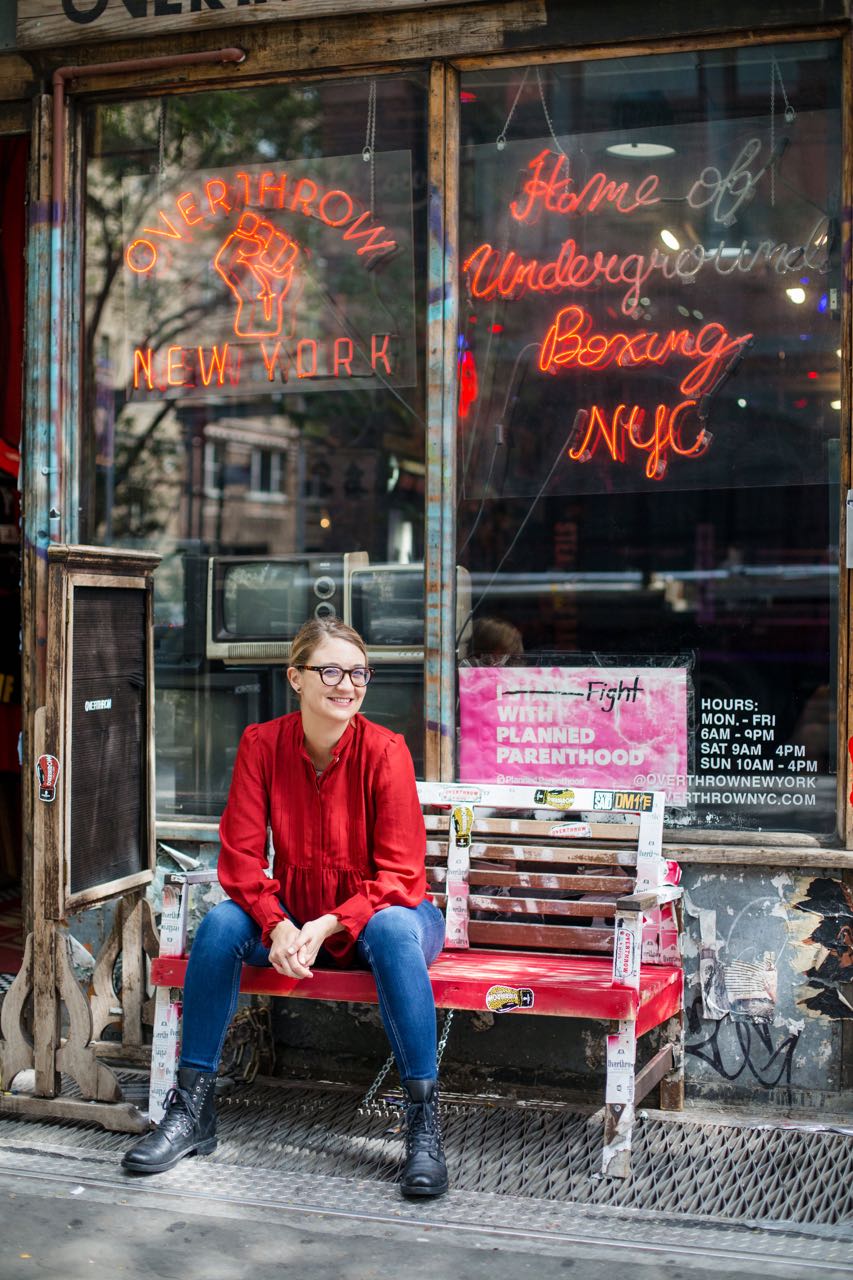
Is there anything else you want to people to know about the piece? Would you like to ask yourself the last question?
Yes. It’s, “Why did you choose to include real teenage debaters in this piece?” I geeked out on the Constitution so hard when I was fifteen-years-old. The Constitution and Russian ballerinas– those were my two obsessions. I wanted to grow up to be either Natalia Makarova or Sandra Day O’Connor, but liberal. And while making this piece it occurred to me that I would love to meet some teenagers who are just as obsessed with our political system as I was at that age. One day it occurred to my great director Oliver Butler and I, that the best way to do that would be to invite a real high-school debater to perform with me. That is how we came up with the idea to end the show with a real live parliamentary debate. We are working with two brilliant debaters — they split performances because they have to go to high school — and one of the greatest delights of this process has been talking about this document with them. Rosdely Ciprian is 14 years old and a champion parliamentary style debater who has a lot to say about what is going on in America right now. And Thursday Williams is a 17-year-old champion debater who interned at The Sonia and Celina Sotomayor Judicial Internship Program this year and wants to be a politician when she grows up. They both make me feel so hopeful about our future.
Since the publication of this piece, The Interval named Heidi Schreck our first-ever Person of the Year for 2018. That interview can be found here.

